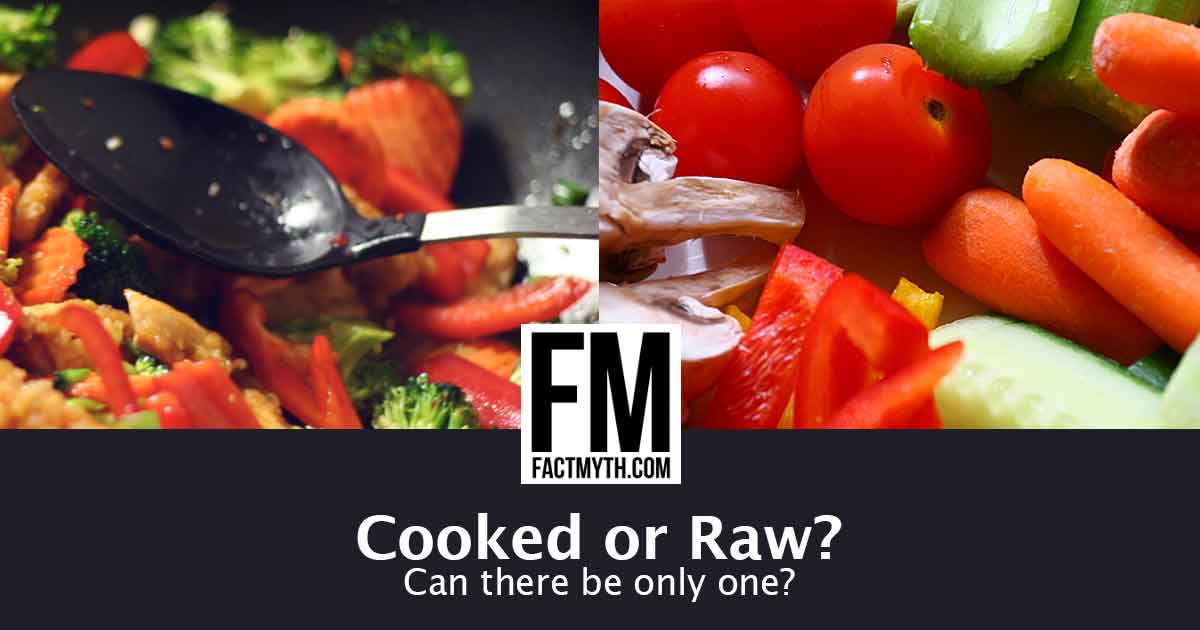Since both an all raw diet or an all cooked diet will each leave you lacking some forms of nutrition, it is best that you eat a diet containing a variety of foods and cooking methods. In general, steaming or slow cooking food along with any liquids they release is the healthiest alternative. Keep in mind that most of us are more likely to eat a healthy diet if it tastes good and is aesthetically appealing.
Raw Vegetables are Healthier Than Cooked Vegetables myth

Are Raw or Cooked Vegetables Healthier?
Only some vegetables are better for you raw than they are cooked. It depends on the specific vegetable, cooking method, and the person. Given this, neither raw nor cooked vegetables are “healthier” in general. Some veggies are best eaten raw, while cooking brings out the best in other vegetables.
Generally, with all food (including vegetables):
- Cooked food is important to our diets. It softens cellulose fibers and raw meat so that we can chew and digest them better.[2] It enables our digestive systems to gain access to nutrients bound to the cell walls.
- Raw food contains live enzymes, which are good for you. Live enzymes get lost in the cooking process.
TIP: One can think of their digestive system as analogous to cooking. The process does some of the work of breaking down the food for absorption, so we don’t have to. Cooking can bring out some nutrients, too much heat can destroy nutrients.
The Raw Foods Movement
The raw food movement advocates consumption of 75% to 100% raw food to maintain an acid/alkaline balance in the body. Its proponents would have you believe that cooking chemically changes nutritious food into a mass of acid-forming toxins, free-radicals, poisons that destroy your health.[3]
In reality, human blood remains in the Ph range of 7.35 – 7.45 and does not vary unless a disease is present. [1] Acidosis and alkalosis are conditions that occur when the blood Ph is abnormally high or low and can create numerous potentially life-threatening health issues.[4] If you are otherwise healthy, your body does not shift from being acidic to being alkaline depending on whether your food is raw or cooked.
A raw diet is not harmful if your body is healthy enough to process it. However, it has not been proven to make anyone more healthy than a diet including a healthy variety of raw and cooked foods.
In a 2008 long-term study published in the British Journal of Nutrition, almost 200 subjects who followed a rigid raw food diet had low levels of the antioxidant Lycopene, even though their levels of beta-carotene and Vitamin A were normal.[5] People with various disorders, including digestive and auto-immune problems, may find it very tough to digest a raw food diet or to synthesize proteins from plant-based food.
The Benefits of Cooking Food
In an interview with Scientific American, Rui Hai Liu, a professor of Food Science at Cornell University said that lycopene, a red pigment found in tomatoes and other red fruits, is a powerful antioxidant that is made increasingly easy to digest by cooking or roasting. In his opinion, lycopene, which we convert to vitamin A, is a more efficient antioxidant that vitamin C.
Other beneficial chemicals are also brought out during cooking. A chemical called Indole forms when cruciferous vegetables such as broccoli, cauliflower or carrots are boiled or steamed. It is linked to a body’s ability to kill precancerous cells before they become malignant. Carotenoids and ferulic acid, found in sweet corn and carrots among other vegetables, are also enhanced by cooking. [6]
Unfortunately, boiling carrots can also lead to a total loss of their polyphenols, some of which seem to reduce the risk of cancer and cardiovascular disease.[7]
3 Foods That Actually Get Healthier When You Cook Them.Drawbacks of Cooking Food
Vitamin C is water soluble, so a significant amount of it is lost in the cooking process. The cooking liquid it is absorbs it. Using that liquid as part of the finished food, as in a soup or gravy, replaces some of the nutrient content.
Sometimes a vegetable such as broccoli, which releases the organic compound indole when cooked, loses beneficial compounds called glucosinolates in the process. Similarly, the health-promoting allicin in garlic is destroyed by cooking, which is why garlic should always be added late in the cooking process rather than early in it.[6]
Variety is the Answer
Since both an all raw diet or an all cooked diet will each leave you lacking some forms of nutrition, it is best that you eat a diet containing a variety of foods and cooking methods.
In general, steaming or slow cooking food and eating it with any liquid it releases is the healthiest alternative. Most of us are more likely to eat a healthy diet if it tastes good and is aesthetically appealing.
Raw Kale is it toxic?TIP: Eating too much of any one food is can be toxic to the body. This means you can technically give yourself kale poisoning. This doesn’t mean kale is “toxic” in the traditional sense. Think of it this way, even too much water can kill you. The point isn’t to avoid a food; variety is the answer.[7]
- http://www.medicinenet.com/script/main/art.asp?articlekey=10001. Definition of Blood pH
- http://www.scientificamerican.com/article/raw-veggies-are-healthier/ . Fact or Fiction: Raw veggies are healthier than cooked ones. Do vegetables lose their nutritional value when heated?
- http://www.rawfoodlife.com/#axzz3zy5iSQvz. American Association for Clinical Chemistry (AACC). Acidosis and Alkalosis
- http://journals.cambridge.org/download.php?file=%2FBJN%2FBJN99_06%2FS0007114507868486a.pdf&code=a6cb0cac4fb2257991802b67ab63f032 British Journal of Nutrition (2008), 99, 1293–130. Long-term strict raw food diet is associated with favorable plasma b-carotene and low plasma lycopene concentrations in Germans. Ada L. Garcia, Corinna Koebnick, Peter C. Dagnelie, Carola Strassner, Ibrahim Elmadfa, Norbert Katz, Claus Leitzmann and Ingrid Hoffmann
- http://www.bbcgoodfood.com/howto/guide/raw-vs-cooked
Raw vs cooked By Kerry Torrens - http://ajcn.nutrition.org/content/81/1/317S.full.pdf+html
Polyphenols and disease risk in epidemiologic studies
Ilja CW Arts and Peter CH Hollman
American Journal Clinical Nutrition January 2005
vol. 81 no. 1 317S-325S - Is Eating Too Much Kale Poisonous?
